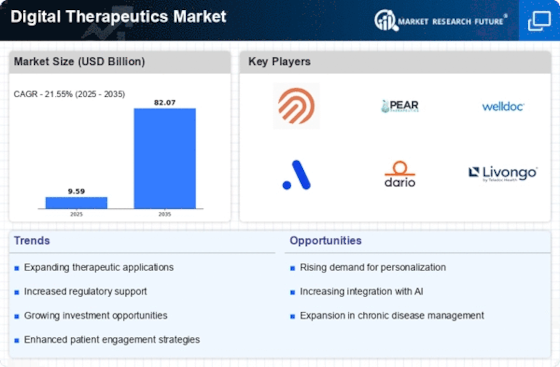-
\r\nDigital therapeutics (DTx) Market, BY Application (USD Billion)
-
\r\n\r\nChronic Disease Management
-
\r\n\r\nMental Health Disorders
-
\r\n\r\nPreventive Care
-
\r\n\r\nGeneral Wellness
-
\r\n\r\nDigital therapeutics (DTx) Market, BY Delivery Mode (USD Billion)
-
\r\n\r\nSoftware
-
\r\n\r\nDevice
-
\r\n\r\nPlatform
-
\r\n\r\nDigital therapeutics (DTx) Market, BY End User (USD Billion)
-
\r\n\r\nPatients
-
\r\n\r\nProviders
-
\r\n\r\nPayers
-
\r\n\r\nEmployers
-
\r\n\r\nDigital therapeutics (DTx) Market, BY Therapeutic Area (USD Billion)
-
\r\n\r\nDiabetes
-
\r\n\r\nCardiology
-
\r\n\r\nNeurology
-
\r\n\r\nOncology
-
\r\n\r\nDigital therapeutics (DTx) Market, BY Regional (USD Billion)
-
\r\n\r\nNorth America
-
\r\n\r\nUS
-
\r\n\r\nCanada
-
\r\n\r\nEurope
-
\r\n\r\nGermany
-
\r\n\r\nUK
-
\r\n\r\nFrance
-
\r\n\r\nRussia
-
\r\n\r\nItaly
-
\r\n\r\nSpain
-
\r\n\r\nRest of Europe
-
\r\n\r\nAPAC
-
\r\n\r\nChina
-
\r\n\r\nIndia
-
\r\n\r\nJapan
-
\r\n\r\nSouth Korea
-
\r\n\r\nMalaysia
-
\r\n\r\nThailand
-
\r\n\r\nIndonesia
-
\r\n\r\nRest of APAC
-
\r\n\r\nSouth America
-
\r\n\r\nBrazil
-
\r\n\r\nMexico
-
\r\n\r\nArgentina
-
\r\n\r\nRest of South America
-
\r\n\r\nMEA
-
\r\n\r\nGCC Countries
-
\r\n\r\nSouth Africa
-
\r\n\r\nRest of MEA
-
\r\n\r\n
-
\r\n
-
\r\n
-
\r\nCompetitive Landscape
-
\r\n\r\nOverview
-
\r\n\r\nCompetitive Analysis
-
\r\n\r\nMarket share Analysis
-
\r\n\r\nMajor Growth Strategy in the Digital therapeutics (DTx) Market
-
\r\n\r\nCompetitive Benchmarking
-
\r\n\r\nLeading Players in Terms of Number of Developments in the Digital therapeutics (DTx) Market
-
\r\n\r\nKey developments and growth strategies
-
\r\n\r\nNew Product Launch/Service Deployment
-
\r\n\r\nMerger & Acquisitions
-
\r\n\r\nJoint Ventures
-
\r\n\r\nMajor Players Financial Matrix
-
\r\n\r\nSales and Operating Income
-
\r\n\r\nMajor Players R&D Expenditure. 2023
-
\r\n\r\nCompany Profiles
-
\r\n\r\nBetter Therapeutics
-
\r\n\r\nFinancial Overview
-
\r\n\r\nProducts Offered
-
\r\n\r\nKey Developments
-
\r\n\r\nSWOT Analysis
-
\r\n\r\nKey Strategies
-
\r\n\r\nMindstrong Health
-
\r\n\r\nFinancial Overview
-
\r\n\r\nProducts Offered
-
\r\n\r\nKey Developments
-
\r\n\r\nSWOT Analysis
-
\r\n\r\nKey Strategies
-
\r\n\r\nPear Therapeutics
-
\r\n\r\nFinancial Overview
-
\r\n\r\nProducts Offered
-
\r\n\r\nKey Developments
-
\r\n\r\nSWOT Analysis
-
\r\n\r\nKey Strategies
-
\r\n\r\nSilverCloud Health
-
\r\n\r\nFinancial Overview
-
\r\n\r\nProducts Offered
-
\r\n\r\nKey Developments
-
\r\n\r\nSWOT Analysis
-
\r\n\r\nKey Strategies
-
\r\n\r\nKnowach
-
\r\n\r\nFinancial Overview
-
\r\n\r\nProducts Offered
-
\r\n\r\nKey Developments
-
\r\n\r\nSWOT Analysis
-
\r\n\r\nKey Strategies
-
\r\n\r\nAkili Interactive
-
\r\n\r\nFinancial Overview
-
\r\n\r\nProducts Offered
-
\r\n\r\nKey Developments
-
\r\n\r\nSWOT Analysis
-
\r\n\r\nKey Strategies
-
\r\n\r\nDarioHealth
-
\r\n\r\nFinancial Overview
-
\r\n\r\nProducts Offered
-
\r\n\r\nKey Developments
-
\r\n\r\nSWOT Analysis
-
\r\n\r\nKey Strategies
-
\r\n\r\nWell Doc
-
\r\n\r\nFinancial Overview
-
\r\n\r\nProducts Offered
-
\r\n\r\nKey Developments
-
\r\n\r\nSWOT Analysis
-
\r\n\r\nKey Strategies
-
\r\n\r\nOmada Health
-
\r\n\r\nFinancial Overview
-
\r\n\r\nProducts Offered
-
\r\n\r\nKey Developments
-
\r\n\r\nSWOT Analysis
-
\r\n\r\nKey Strategies
-
\r\n\r\nGinger
-
\r\n\r\nFinancial Overview
-
\r\n\r\nProducts Offered
-
\r\n\r\nKey Developments
-
\r\n\r\nSWOT Analysis
-
\r\n\r\nKey Strategies
-
\r\n\r\nLivongo Health
-
\r\n\r\nFinancial Overview
-
\r\n\r\nProducts Offered
-
\r\n\r\nKey Developments
-
\r\n\r\nSWOT Analysis
-
\r\n\r\nKey Strategies
-
\r\n\r\nZecotek Photonics
-
\r\n\r\nFinancial Overview
-
\r\n\r\nProducts Offered
-
\r\n\r\nKey Developments
-
\r\n\r\nSWOT Analysis
-
\r\n\r\nKey Strategies
-
\r\n\r\nHappify Health
-
\r\n\r\nFinancial Overview
-
\r\n\r\nProducts Offered
-
\r\n\r\nKey Developments
-
\r\n\r\nSWOT Analysis
-
\r\n\r\nKey Strategies
-
\r\n\r\nBig Health
-
\r\n\r\nFinancial Overview
-
\r\n\r\nProducts Offered
-
\r\n\r\nKey Developments
-
\r\n\r\nSWOT Analysis
-
\r\n\r\nKey Strategies
-
\r\n\r\nBiofourmis
-
\r\n\r\nFinancial Overview
-
\r\n\r\nProducts Offered
-
\r\n\r\nKey Developments
-
\r\n\r\nSWOT Analysis
-
\r\n\r\nKey Strategies
-
\r\n\r\nAppendix
-
\r\n\r\nReferences
-
\r\n\r\nRelated Reports
-
\r\n\r\n
-
LIST Of tables
-
\r\n
-
\r\n
-
\r\nLIST OF ASSUMPTIONS
-
\r\n\r\nNorth America Digital therapeutics (DTx) Market SIZE ESTIMATES & FORECAST, BY APPLICATION, 2019-2035 (USD Billions)
-
\r\n\r\nNorth America Digital therapeutics (DTx) Market SIZE ESTIMATES & FORECAST, BY DELIVERY MODE, 2019-2035 (USD Billions)
-
\r\n\r\nNorth America Digital therapeutics (DTx) Market SIZE ESTIMATES & FORECAST, BY END USER, 2019-2035 (USD Billions)
-
\r\n\r\nNorth America Digital therapeutics (DTx) Market SIZE ESTIMATES & FORECAST, BY THERAPEUTIC AREA, 2019-2035 (USD Billions)
-
\r\n\r\nNorth America Digital therapeutics (DTx) Market SIZE ESTIMATES & FORECAST, BY REGIONAL, 2019-2035 (USD Billions)
-
\r\n\r\nUS Digital therapeutics (DTx) Market SIZE ESTIMATES & FORECAST, BY APPLICATION, 2019-2035 (USD Billions)
-
\r\n\r\nUS Digital therapeutics (DTx) Market SIZE ESTIMATES & FORECAST, BY DELIVERY MODE, 2019-2035 (USD Billions)
-
\r\n\r\nUS Digital therapeutics (DTx) Market SIZE ESTIMATES & FORECAST, BY END USER, 2019-2035 (USD Billions)
-
\r\n\r\nUS Digital therapeutics (DTx) Market SIZE ESTIMATES & FORECAST, BY THERAPEUTIC AREA, 2019-2035 (USD Billions)
-
\r\n\r\nUS Digital therapeutics (DTx) Market SIZE ESTIMATES & FORECAST, BY REGIONAL, 2019-2035 (USD Billions)
-
\r\n\r\nCanada Digital therapeutics (DTx) Market SIZE ESTIMATES & FORECAST, BY APPLICATION, 2019-2035 (USD Billions)
-
\r\n\r\nCanada Digital therapeutics (DTx) Market SIZE ESTIMATES & FORECAST, BY DELIVERY MODE, 2019-2035 (USD Billions)
-
\r\n\r\nCanada Digital therapeutics (DTx) Market SIZE ESTIMATES & FORECAST, BY END USER, 2019-2035 (USD Billions)
-
\r\n\r\nCanada Digital therapeutics (DTx) Market SIZE ESTIMATES & FORECAST, BY THERAPEUTIC AREA, 2019-2035 (USD Billions)
-
\r\n\r\nCanada Digital therapeutics (DTx) Market SIZE ESTIMATES & FORECAST, BY REGIONAL, 2019-2035 (USD Billions)
-
\r\n\r\nEurope Digital therapeutics (DTx) Market SIZE ESTIMATES & FORECAST, BY APPLICATION, 2019-2035 (USD Billions)
-
\r\n\r\nEurope Digital therapeutics (DTx) Market SIZE ESTIMATES & FORECAST, BY DELIVERY MODE, 2019-2035 (USD Billions)
-
\r\n\r\nEurope Digital therapeutics (DTx) Market SIZE ESTIMATES & FORECAST, BY END USER, 2019-2035 (USD Billions)
-
\r\n\r\nEurope Digital therapeutics (DTx) Market SIZE ESTIMATES & FORECAST, BY THERAPEUTIC AREA, 2019-2035 (USD Billions)
-
\r\n\r\nEurope Digital therapeutics (DTx) Market SIZE ESTIMATES & FORECAST, BY REGIONAL, 2019-2035 (USD Billions)
-
\r\n\r\nGermany Digital therapeutics (DTx) Market SIZE ESTIMATES & FORECAST, BY APPLICATION, 2019-2035 (USD Billions)
-
\r\n\r\nGermany Digital therapeutics (DTx) Market SIZE ESTIMATES & FORECAST, BY DELIVERY MODE, 2019-2035 (USD Billions)
-
\r\n\r\nGermany Digital therapeutics (DTx) Market SIZE ESTIMATES & FORECAST, BY END USER, 2019-2035 (USD Billions)
-
\r\n\r\nGermany Digital therapeutics (DTx) Market SIZE ESTIMATES & FORECAST, BY THERAPEUTIC AREA, 2019-2035 (USD Billions)
-
\r\n\r\nGermany Digital therapeutics (DTx) Market SIZE ESTIMATES & FORECAST, BY REGIONAL, 2019-2035 (USD Billions)
-
\r\n\r\nUK Digital therapeutics (DTx) Market SIZE ESTIMATES & FORECAST, BY APPLICATION, 2019-2035 (USD Billions)
-
\r\n\r\nUK Digital therapeutics (DTx) Market SIZE ESTIMATES & FORECAST, BY DELIVERY MODE, 2019-2035 (USD Billions)
-
\r\n\r\nUK Digital therapeutics (DTx) Market SIZE ESTIMATES & FORECAST, BY END USER, 2019-2035 (USD Billions)
-
\r\n\r\nUK Digital therapeutics (DTx) Market SIZE ESTIMATES & FORECAST, BY THERAPEUTIC AREA, 2019-2035 (USD Billions)
-
\r\n\r\nUK Digital therapeutics (DTx) Market SIZE ESTIMATES & FORECAST, BY REGIONAL, 2019-2035 (USD Billions)
-
\r\n\r\nFrance Digital therapeutics (DTx) Market SIZE ESTIMATES & FORECAST, BY APPLICATION, 2019-2035 (USD Billions)
-
\r\n\r\nFrance Digital therapeutics (DTx) Market SIZE ESTIMATES & FORECAST, BY DELIVERY MODE, 2019-2035 (USD Billions)
-
\r\n\r\nFrance Digital therapeutics (DTx) Market SIZE ESTIMATES & FORECAST, BY END USER, 2019-2035 (USD Billions)
-
\r\n\r\nFrance Digital therapeutics (DTx) Market SIZE ESTIMATES & FORECAST, BY THERAPEUTIC AREA, 2019-2035 (USD Billions)
-
\r\n\r\nFrance Digital therapeutics (DTx) Market SIZE ESTIMATES & FORECAST, BY REGIONAL, 2019-2035 (USD Billions)
-
\r\n\r\nRussia Digital therapeutics (DTx) Market SIZE ESTIMATES & FORECAST, BY APPLICATION, 2019-2035 (USD Billions)
-
\r\n\r\nRussia Digital therapeutics (DTx) Market SIZE ESTIMATES & FORECAST, BY DELIVERY MODE, 2019-2035 (USD Billions)
-
\r\n\r\nRussia Digital therapeutics (DTx) Market SIZE ESTIMATES & FORECAST, BY END USER, 2019-2035 (USD Billions)
-
\r\n\r\nRussia Digital therapeutics (DTx) Market SIZE ESTIMATES & FORECAST, BY THERAPEUTIC AREA, 2019-2035 (USD Billions)
-
\r\n\r\nRussia Digital therapeutics (DTx) Market SIZE ESTIMATES & FORECAST, BY REGIONAL, 2019-2035 (USD Billions)
-
\r\n\r\nItaly Digital therapeutics (DTx) Market SIZE ESTIMATES & FORECAST, BY APPLICATION, 2019-2035 (USD Billions)
-
\r\n\r\nItaly Digital therapeutics (DTx) Market SIZE ESTIMATES & FORECAST, BY DELIVERY MODE, 2019-2035 (USD Billions)
-
\r\n\r\nItaly Digital therapeutics (DTx) Market SIZE ESTIMATES & FORECAST, BY END USER, 2019-2035 (USD Billions)
-
\r\n\r\nItaly Digital therapeutics (DTx) Market SIZE ESTIMATES & FORECAST, BY THERAPEUTIC AREA, 2019-2035 (USD Billions)
-
\r\n\r\nItaly Digital therapeutics (DTx) Market SIZE ESTIMATES & FORECAST, BY REGIONAL, 2019-2035 (USD Billions)
-
\r\n\r\nSpain Digital therapeutics (DTx) Market SIZE ESTIMATES & FORECAST, BY APPLICATION, 2019-2035 (USD Billions)
-
\r\n\r\nSpain Digital therapeutics (DTx) Market SIZE ESTIMATES & FORECAST, BY DELIVERY MODE, 2019-2035 (USD Billions)
-
\r\n\r\nSpain Digital therapeutics (DTx) Market SIZE ESTIMATES & FORECAST, BY END USER, 2019-2035 (USD Billions)
-
\r\n\r\nSpain Digital therapeutics (DTx) Market SIZE ESTIMATES & FORECAST, BY THERAPEUTIC AREA, 2019-2035 (USD Billions)
-
\r\n\r\nSpain Digital therapeutics (DTx) Market SIZE ESTIMATES & FORECAST, BY REGIONAL, 2019-2035 (USD Billions)
-
\r\n\r\nRest of Europe Digital therapeutics (DTx) Market SIZE ESTIMATES & FORECAST, BY APPLICATION, 2019-2035 (USD Billions)
-
\r\n\r\nRest of Europe Digital therapeutics (DTx) Market SIZE ESTIMATES & FORECAST, BY DELIVERY MODE, 2019-2035 (USD Billions)
-
\r\n\r\nRest of Europe Digital therapeutics (DTx) Market SIZE ESTIMATES & FORECAST, BY END USER, 2019-2035 (USD Billions)
-
\r\n\r\nRest of Europe Digital therapeutics (DTx) Market SIZE ESTIMATES & FORECAST, BY THERAPEUTIC AREA, 2019-2035 (USD Billions)
-
\r\n\r\nRest of Europe Digital therapeutics (DTx) Market SIZE ESTIMATES & FORECAST, BY REGIONAL, 2019-2035 (USD Billions)
-
\r\n\r\nAPAC Digital therapeutics (DTx) Market SIZE ESTIMATES & FORECAST, BY APPLICATION, 2019-2035 (USD Billions)
-
\r\n\r\nAPAC Digital therapeutics (DTx) Market SIZE ESTIMATES & FORECAST, BY DELIVERY MODE, 2019-2035 (USD Billions)
-
\r\n\r\nAPAC Digital therapeutics (DTx) Market SIZE ESTIMATES & FORECAST, BY END USER, 2019-2035 (USD Billions)
-
\r\n\r\nAPAC Digital therapeutics (DTx) Market SIZE ESTIMATES & FORECAST, BY THERAPEUTIC AREA, 2019-2035 (USD Billions)
-
\r\n\r\nAPAC Digital therapeutics (DTx) Market SIZE ESTIMATES & FORECAST, BY REGIONAL, 2019-2035 (USD Billions)
-
\r\n\r\nChina Digital therapeutics (DTx) Market SIZE ESTIMATES & FORECAST, BY APPLICATION, 2019-2035 (USD Billions)
-
\r\n\r\nChina Digital therapeutics (DTx) Market SIZE ESTIMATES & FORECAST, BY DELIVERY MODE, 2019-2035 (USD Billions)
-
\r\n\r\nChina Digital therapeutics (DTx) Market SIZE ESTIMATES & FORECAST, BY END USER, 2019-2035 (USD Billions)
-
\r\n\r\nChina Digital therapeutics (DTx) Market SIZE ESTIMATES & FORECAST, BY THERAPEUTIC AREA, 2019-2035 (USD Billions)
-
\r\n\r\nChina Digital therapeutics (DTx) Market SIZE ESTIMATES & FORECAST, BY REGIONAL, 2019-2035 (USD Billions)
-
\r\n\r\nIndia Digital therapeutics (DTx) Market SIZE ESTIMATES & FORECAST, BY APPLICATION, 2019-2035 (USD Billions)
-
\r\n\r\nIndia Digital therapeutics (DTx) Market SIZE ESTIMATES & FORECAST, BY DELIVERY MODE, 2019-2035 (USD Billions)
-
\r\n\r\nIndia Digital therapeutics (DTx) Market SIZE ESTIMATES & FORECAST, BY END USER, 2019-2035 (USD Billions)
-
\r\n\r\nIndia Digital therapeutics (DTx) Market SIZE ESTIMATES & FORECAST, BY THERAPEUTIC AREA, 2019-2035 (USD Billions)
-
\r\n\r\nIndia Digital therapeutics (DTx) Market SIZE ESTIMATES & FORECAST, BY REGIONAL, 2019-2035 (USD Billions)
-
\r\n\r\nJapan Digital therapeutics (DTx) Market SIZE ESTIMATES & FORECAST, BY APPLICATION, 2019-2035 (USD Billions)
-
\r\n\r\nJapan Digital therapeutics (DTx) Market SIZE ESTIMATES & FORECAST, BY DELIVERY MODE, 2019-2035 (USD Billions)
-
\r\n\r\nJapan Digital therapeutics (DTx) Market SIZE ESTIMATES & FORECAST, BY END USER, 2019-2035 (USD Billions)
-
\r\n\r\nJapan Digital therapeutics (DTx) Market SIZE ESTIMATES & FORECAST, BY THERAPEUTIC AREA, 2019-2035 (USD Billions)
-
\r\n\r\nJapan Digital therapeutics (DTx) Market SIZE ESTIMATES & FORECAST, BY REGIONAL, 2019-2035 (USD Billions)
-
\r\n\r\nSouth Korea Digital therapeutics (DTx) Market SIZE ESTIMATES & FORECAST, BY APPLICATION, 2019-2035 (USD Billions)
-
\r\n\r\nSouth Korea Digital therapeutics (DTx) Market SIZE ESTIMATES & FORECAST, BY DELIVERY MODE, 2019-2035 (USD Billions)
-
\r\n\r\nSouth Korea Digital therapeutics (DTx) Market SIZE ESTIMATES & FORECAST, BY END USER, 2019-2035 (USD Billions)
-
\r\n\r\nSouth Korea Digital therapeutics (DTx) Market SIZE ESTIMATES & FORECAST, BY THERAPEUTIC AREA, 2019-2035 (USD Billions)
-
\r\n\r\nSouth Korea Digital therapeutics (DTx) Market SIZE ESTIMATES & FORECAST, BY REGIONAL, 2019-2035 (USD Billions)
-
\r\n\r\nMalaysia Digital therapeutics (DTx) Market SIZE ESTIMATES & FORECAST, BY APPLICATION, 2019-2035 (USD Billions)
-
\r\n\r\nMalaysia Digital therapeutics (DTx) Market SIZE ESTIMATES & FORECAST, BY DELIVERY MODE, 2019-2035 (USD Billions)
-
\r\n\r\nMalaysia Digital therapeutics (DTx) Market SIZE ESTIMATES & FORECAST, BY END USER, 2019-2035 (USD Billions)
-
\r\n\r\nMalaysia Digital therapeutics (DTx) Market SIZE ESTIMATES & FORECAST, BY THERAPEUTIC AREA, 2019-2035 (USD Billions)
-
\r\n\r\nMalaysia Digital therapeutics (DTx) Market SIZE ESTIMATES & FORECAST, BY REGIONAL, 2019-2035 (USD Billions)
-
\r\n\r\nThailand Digital therapeutics (DTx) Market SIZE ESTIMATES & FORECAST, BY APPLICATION, 2019-2035 (USD Billions)
-
\r\n\r\nThailand Digital therapeutics (DTx) Market SIZE ESTIMATES & FORECAST, BY DELIVERY MODE, 2019-2035 (USD Billions)
-
\r\n\r\nThailand Digital therapeutics (DTx) Market SIZE ESTIMATES & FORECAST, BY END USER, 2019-2035 (USD Billions)
-
\r\n\r\nThailand Digital therapeutics (DTx) Market SIZE ESTIMATES & FORECAST, BY THERAPEUTIC AREA, 2019-2035 (USD Billions)
-
\r\n\r\nThailand Digital therapeutics (DTx) Market SIZE ESTIMATES & FORECAST, BY REGIONAL, 2019-2035 (USD Billions)
-
\r\n\r\nIndonesia Digital therapeutics (DTx) Market SIZE ESTIMATES & FORECAST, BY APPLICATION, 2019-2035 (USD Billions)
-
\r\n\r\nIndonesia Digital therapeutics (DTx) Market SIZE ESTIMATES & FORECAST, BY DELIVERY MODE, 2019-2035 (USD Billions)
-
\r\n\r\nIndonesia Digital therapeutics (DTx) Market SIZE ESTIMATES & FORECAST, BY END USER, 2019-2035 (USD Billions)
-
\r\n\r\nIndonesia Digital therapeutics (DTx) Market SIZE ESTIMATES & FORECAST, BY THERAPEUTIC AREA, 2019-2035 (USD Billions)
-
\r\n\r\nIndonesia Digital therapeutics (DTx) Market SIZE ESTIMATES & FORECAST, BY REGIONAL, 2019-2035 (USD Billions)
-
\r\n\r\nRest of APAC Digital therapeutics (DTx) Market SIZE ESTIMATES & FORECAST, BY APPLICATION, 2019-2035 (USD Billions)
-
\r\n\r\nRest of APAC Digital therapeutics (DTx) Market SIZE ESTIMATES & FORECAST, BY DELIVERY MODE, 2019-2035 (USD Billions)
-
\r\n\r\nRest of APAC Digital therapeutics (DTx) Market SIZE ESTIMATES & FORECAST, BY END USER, 2019-2035 (USD Billions)
-
\r\n\r\nRest of APAC Digital therapeutics (DTx) Market SIZE ESTIMATES & FORECAST, BY THERAPEUTIC AREA, 2019-2035 (USD Billions)
-
\r\n\r\nRest of APAC Digital therapeutics (DTx) Market SIZE ESTIMATES & FORECAST, BY REGIONAL, 2019-2035 (USD Billions)
-
\r\n\r\nSouth America Digital therapeutics (DTx) Market SIZE ESTIMATES & FORECAST, BY APPLICATION, 2019-2035 (USD Billions)
-
\r\n\r\nSouth America Digital therapeutics (DTx) Market SIZE ESTIMATES & FORECAST, BY DELIVERY MODE, 2019-2035 (USD Billions)
-
\r\n\r\nSouth America Digital therapeutics (DTx) Market SIZE ESTIMATES & FORECAST, BY END USER, 2019-2035 (USD Billions)
-
\r\n\r\nSouth America Digital therapeutics (DTx) Market SIZE ESTIMATES & FORECAST, BY THERAPEUTIC AREA, 2019-2035 (USD Billions)
-
\r\n\r\nSouth America Digital therapeutics (DTx) Market SIZE ESTIMATES & FORECAST, BY REGIONAL, 2019-2035 (USD Billions)
-
\r\n\r\nBrazil Digital therapeutics (DTx) Market SIZE ESTIMATES & FORECAST, BY APPLICATION, 2019-2035 (USD Billions)
-
\r\n\r\nBrazil Digital therapeutics (DTx) Market SIZE ESTIMATES & FORECAST, BY DELIVERY MODE, 2019-2035 (USD Billions)
-
\r\n\r\nBrazil Digital therapeutics (DTx) Market SIZE ESTIMATES & FORECAST, BY END USER, 2019-2035 (USD Billions)
-
\r\n\r\nBrazil Digital therapeutics (DTx) Market SIZE ESTIMATES & FORECAST, BY THERAPEUTIC AREA, 2019-2035 (USD Billions)
-
\r\n\r\nBrazil Digital therapeutics (DTx) Market SIZE ESTIMATES & FORECAST, BY REGIONAL, 2019-2035 (USD Billions)
-
\r\n\r\nMexico Digital therapeutics (DTx) Market SIZE ESTIMATES & FORECAST, BY APPLICATION, 2019-2035 (USD Billions)
-
\r\n\r\nMexico Digital therapeutics (DTx) Market SIZE ESTIMATES & FORECAST, BY DELIVERY MODE, 2019-2035 (USD Billions)
-
\r\n\r\nMexico Digital therapeutics (DTx) Market SIZE ESTIMATES & FORECAST, BY END USER, 2019-2035 (USD Billions)
-
\r\n\r\nMexico Digital therapeutics (DTx) Market SIZE ESTIMATES & FORECAST, BY THERAPEUTIC AREA, 2019-2035 (USD Billions)
-
\r\n\r\nMexico Digital therapeutics (DTx) Market SIZE ESTIMATES & FORECAST, BY REGIONAL, 2019-2035 (USD Billions)
-
\r\n\r\nArgentina Digital therapeutics (DTx) Market SIZE ESTIMATES & FORECAST, BY APPLICATION, 2019-2035 (USD Billions)
-
\r\n\r\nArgentina Digital therapeutics (DTx) Market SIZE ESTIMATES & FORECAST, BY DELIVERY MODE, 2019-2035 (USD Billions)
-
\r\n\r\nArgentina Digital therapeutics (DTx) Market SIZE ESTIMATES & FORECAST, BY END USER, 2019-2035 (USD Billions)
-
\r\n\r\nArgentina Digital therapeutics (DTx) Market SIZE ESTIMATES & FORECAST, BY THERAPEUTIC AREA, 2019-2035 (USD Billions)
-
\r\n\r\nArgentina Digital therapeutics (DTx) Market SIZE ESTIMATES & FORECAST, BY REGIONAL, 2019-2035 (USD Billions)
-
\r\n\r\nRest of South America Digital therapeutics (DTx) Market SIZE ESTIMATES & FORECAST, BY APPLICATION, 2019-2035 (USD Billions)
-
\r\n\r\nRest of South America Digital therapeutics (DTx) Market SIZE ESTIMATES & FORECAST, BY DELIVERY MODE, 2019-2035 (USD Billions)
-
\r\n\r\nRest of South America Digital therapeutics (DTx) Market SIZE ESTIMATES & FORECAST, BY END USER, 2019-2035 (USD Billions)
-
\r\n\r\nRest of South America Digital therapeutics (DTx) Market SIZE ESTIMATES & FORECAST, BY THERAPEUTIC AREA, 2019-2035 (USD Billions)
-
\r\n\r\nRest of South America Digital therapeutics (DTx) Market SIZE ESTIMATES & FORECAST, BY REGIONAL, 2019-2035 (USD Billions)
-
\r\n\r\nMEA Digital therapeutics (DTx) Market SIZE ESTIMATES & FORECAST, BY APPLICATION, 2019-2035 (USD Billions)
-
\r\n\r\nMEA Digital therapeutics (DTx) Market SIZE ESTIMATES & FORECAST, BY DELIVERY MODE, 2019-2035 (USD Billions)
-
\r\n\r\nMEA Digital therapeutics (DTx) Market SIZE ESTIMATES & FORECAST, BY END USER, 2019-2035 (USD Billions)
-
\r\n\r\nMEA Digital therapeutics (DTx) Market SIZE ESTIMATES & FORECAST, BY THERAPEUTIC AREA, 2019-2035 (USD Billions)
-
\r\n\r\nMEA Digital therapeutics (DTx) Market SIZE ESTIMATES & FORECAST, BY REGIONAL, 2019-2035 (USD Billions)
-
\r\n\r\nGCC Countries Digital therapeutics (DTx) Market SIZE ESTIMATES & FORECAST, BY APPLICATION, 2019-2035 (USD Billions)
-
\r\n\r\nGCC Countries Digital therapeutics (DTx) Market SIZE ESTIMATES & FORECAST, BY DELIVERY MODE, 2019-2035 (USD Billions)
-
\r\n\r\nGCC Countries Digital therapeutics (DTx) Market SIZE ESTIMATES & FORECAST, BY END USER, 2019-2035 (USD Billions)
-
\r\n\r\nGCC Countries Digital therapeutics (DTx) Market SIZE ESTIMATES & FORECAST, BY THERAPEUTIC AREA, 2019-2035 (USD Billions)
-
\r\n\r\nGCC Countries Digital therapeutics (DTx) Market SIZE ESTIMATES & FORECAST, BY REGIONAL, 2019-2035 (USD Billions)
-
\r\n\r\nSouth Africa Digital therapeutics (DTx) Market SIZE ESTIMATES & FORECAST, BY APPLICATION, 2019-2035 (USD Billions)
-
\r\n\r\nSouth Africa Digital therapeutics (DTx) Market SIZE ESTIMATES & FORECAST, BY DELIVERY MODE, 2019-2035 (USD Billions)
-
\r\n\r\nSouth Africa Digital therapeutics (DTx) Market SIZE ESTIMATES & FORECAST, BY END USER, 2019-2035 (USD Billions)
-
\r\n\r\nSouth Africa Digital therapeutics (DTx) Market SIZE ESTIMATES & FORECAST, BY THERAPEUTIC AREA, 2019-2035 (USD Billions)
-
\r\n\r\nSouth Africa Digital therapeutics (DTx) Market SIZE ESTIMATES & FORECAST, BY REGIONAL, 2019-2035 (USD Billions)
-
\r\n\r\nRest of MEA Digital therapeutics (DTx) Market SIZE ESTIMATES & FORECAST, BY APPLICATION, 2019-2035 (USD Billions)
-
\r\n\r\nRest of MEA Digital therapeutics (DTx) Market SIZE ESTIMATES & FORECAST, BY DELIVERY MODE, 2019-2035 (USD Billions)
-
\r\n\r\nRest of MEA Digital therapeutics (DTx) Market SIZE ESTIMATES & FORECAST, BY END USER, 2019-2035 (USD Billions)
-
\r\n\r\nRest of MEA Digital therapeutics (DTx) Market SIZE ESTIMATES & FORECAST, BY THERAPEUTIC AREA, 2019-2035 (USD Billions)
-
\r\n\r\nRest of MEA Digital therapeutics (DTx) Market SIZE ESTIMATES & FORECAST, BY REGIONAL, 2019-2035 (USD Billions)
-
\r\n\r\nPRODUCT LAUNCH/PRODUCT DEVELOPMENT/APPROVAL
-
\r\n\r\nACQUISITION/PARTNERSHIP
-
\r\n\r\n
-
\r\n
-
\r\n
-
\r\n
-
\r\n
-
\r\n
-
\r\n
-
\r\n
-
\r\n
-
\r\n
-
\r\n
-
\r\n
-
\r\n
-
\r\n
-
\r\n
-
\r\n
-
\r\n
-
\r\n
-
\r\n
-
\r\n
-
\r\n
-
\r\n
-
\r\n
-
\r\n
-
\r\n
-
\r\n
-
\r\n
-
\r\n
-
\r\n
-
\r\n
-
LIST Of figures
-
\r\n
-
\r\n
-
\r\nMARKET SYNOPSIS
-
\r\n\r\nNORTH AMERICA Digital therapeutics (DTx) Market ANALYSIS
-
\r\n\r\nUS Digital therapeutics (DTx) Market ANALYSIS BY APPLICATION
-
\r\n\r\nUS Digital therapeutics (DTx) Market ANALYSIS BY DELIVERY MODE
-
\r\n\r\nUS Digital therapeutics (DTx) Market ANALYSIS BY END USER
-
\r\n\r\nUS Digital therapeutics (DTx) Market ANALYSIS BY THERAPEUTIC AREA
-
\r\n\r\nUS Digital therapeutics (DTx) Market ANALYSIS BY REGIONAL
-
\r\n\r\nCANADA Digital therapeutics (DTx) Market ANALYSIS BY APPLICATION
-
\r\n\r\nCANADA Digital therapeutics (DTx) Market ANALYSIS BY DELIVERY MODE
-
\r\n\r\nCANADA Digital therapeutics (DTx) Market ANALYSIS BY END USER
-
\r\n\r\nCANADA Digital therapeutics (DTx) Market ANALYSIS BY THERAPEUTIC AREA
-
\r\n\r\nCANADA Digital therapeutics (DTx) Market ANALYSIS BY REGIONAL
-
\r\n\r\nEUROPE Digital therapeutics (DTx) Market ANALYSIS
-
\r\n\r\nGERMANY Digital therapeutics (DTx) Market ANALYSIS BY APPLICATION
-
\r\n\r\nGERMANY Digital therapeutics (DTx) Market ANALYSIS BY DELIVERY MODE
-
\r\n\r\nGERMANY Digital therapeutics (DTx) Market ANALYSIS BY END USER
-
\r\n\r\nGERMANY Digital therapeutics (DTx) Market ANALYSIS BY THERAPEUTIC AREA
-
\r\n\r\nGERMANY Digital therapeutics (DTx) Market ANALYSIS BY REGIONAL
-
\r\n\r\nUK Digital therapeutics (DTx) Market ANALYSIS BY APPLICATION
-
\r\n\r\nUK Digital therapeutics (DTx) Market ANALYSIS BY DELIVERY MODE
-
\r\n\r\nUK Digital therapeutics (DTx) Market ANALYSIS BY END USER
-
\r\n\r\nUK Digital therapeutics (DTx) Market ANALYSIS BY THERAPEUTIC AREA
-
\r\n\r\nUK Digital therapeutics (DTx) Market ANALYSIS BY REGIONAL
-
\r\n\r\nFRANCE Digital therapeutics (DTx) Market ANALYSIS BY APPLICATION
-
\r\n\r\nFRANCE Digital therapeutics (DTx) Market ANALYSIS BY DELIVERY MODE
-
\r\n\r\nFRANCE Digital therapeutics (DTx) Market ANALYSIS BY END USER
-
\r\n\r\nFRANCE Digital therapeutics (DTx) Market ANALYSIS BY THERAPEUTIC AREA
-
\r\n\r\nFRANCE Digital therapeutics (DTx) Market ANALYSIS BY REGIONAL
-
\r\n\r\nRUSSIA Digital therapeutics (DTx) Market ANALYSIS BY APPLICATION
-
\r\n\r\nRUSSIA Digital therapeutics (DTx) Market ANALYSIS BY DELIVERY MODE
-
\r\n\r\nRUSSIA Digital therapeutics (DTx) Market ANALYSIS BY END USER
-
\r\n\r\nRUSSIA Digital therapeutics (DTx) Market ANALYSIS BY THERAPEUTIC AREA
-
\r\n\r\nRUSSIA Digital therapeutics (DTx) Market ANALYSIS BY REGIONAL
-
\r\n\r\nITALY Digital therapeutics (DTx) Market ANALYSIS BY APPLICATION
-
\r\n\r\nITALY Digital therapeutics (DTx) Market ANALYSIS BY DELIVERY MODE
-
\r\n\r\nITALY Digital therapeutics (DTx) Market ANALYSIS BY END USER
-
\r\n\r\nITALY Digital therapeutics (DTx) Market ANALYSIS BY THERAPEUTIC AREA
-
\r\n\r\nITALY Digital therapeutics (DTx) Market ANALYSIS BY REGIONAL
-
\r\n\r\nSPAIN Digital therapeutics (DTx) Market ANALYSIS BY APPLICATION
-
\r\n\r\nSPAIN Digital therapeutics (DTx) Market ANALYSIS BY DELIVERY MODE
-
\r\n\r\nSPAIN Digital therapeutics (DTx) Market ANALYSIS BY END USER
-
\r\n\r\nSPAIN Digital therapeutics (DTx) Market ANALYSIS BY THERAPEUTIC AREA
-
\r\n\r\nSPAIN Digital therapeutics (DTx) Market ANALYSIS BY REGIONAL
-
\r\n\r\nREST OF EUROPE Digital therapeutics (DTx) Market ANALYSIS BY APPLICATION
-
\r\n\r\nREST OF EUROPE Digital therapeutics (DTx) Market ANALYSIS BY DELIVERY MODE
-
\r\n\r\nREST OF EUROPE Digital therapeutics (DTx) Market ANALYSIS BY END USER
-
\r\n\r\nREST OF EUROPE Digital therapeutics (DTx) Market ANALYSIS BY THERAPEUTIC AREA
-
\r\n\r\nREST OF EUROPE Digital therapeutics (DTx) Market ANALYSIS BY REGIONAL
-
\r\n\r\nAPAC Digital therapeutics (DTx) Market ANALYSIS
-
\r\n\r\nCHINA Digital therapeutics (DTx) Market ANALYSIS BY APPLICATION
-
\r\n\r\nCHINA Digital therapeutics (DTx) Market ANALYSIS BY DELIVERY MODE
-
\r\n\r\nCHINA Digital therapeutics (DTx) Market ANALYSIS BY END USER
-
\r\n\r\nCHINA Digital therapeutics (DTx) Market ANALYSIS BY THERAPEUTIC AREA
-
\r\n\r\nCHINA Digital therapeutics (DTx) Market ANALYSIS BY REGIONAL
-
\r\n\r\nINDIA Digital therapeutics (DTx) Market ANALYSIS BY APPLICATION
-
\r\n\r\nINDIA Digital therapeutics (DTx) Market ANALYSIS BY DELIVERY MODE
-
\r\n\r\nINDIA Digital therapeutics (DTx) Market ANALYSIS BY END USER
-
\r\n\r\nINDIA Digital therapeutics (DTx) Market ANALYSIS BY THERAPEUTIC AREA
-
\r\n\r\nINDIA Digital therapeutics (DTx) Market ANALYSIS BY REGIONAL
-
\r\n\r\nJAPAN Digital therapeutics (DTx) Market ANALYSIS BY APPLICATION
-
\r\n\r\nJAPAN Digital therapeutics (DTx) Market ANALYSIS BY DELIVERY MODE
-
\r\n\r\nJAPAN Digital therapeutics (DTx) Market ANALYSIS BY END USER
-
\r\n\r\nJAPAN Digital therapeutics (DTx) Market ANALYSIS BY THERAPEUTIC AREA
-
\r\n\r\nJAPAN Digital therapeutics (DTx) Market ANALYSIS BY REGIONAL
-
\r\n\r\nSOUTH KOREA Digital therapeutics (DTx) Market ANALYSIS BY APPLICATION
-
\r\n\r\nSOUTH KOREA Digital therapeutics (DTx) Market ANALYSIS BY DELIVERY MODE
-
\r\n\r\nSOUTH KOREA Digital therapeutics (DTx) Market ANALYSIS BY END USER
-
\r\n\r\nSOUTH KOREA Digital therapeutics (DTx) Market ANALYSIS BY THERAPEUTIC AREA
-
\r\n\r\nSOUTH KOREA Digital therapeutics (DTx) Market ANALYSIS BY REGIONAL
-
\r\n\r\nMALAYSIA Digital therapeutics (DTx) Market ANALYSIS BY APPLICATION
-
\r\n\r\nMALAYSIA Digital therapeutics (DTx) Market ANALYSIS BY DELIVERY MODE
-
\r\n\r\nMALAYSIA Digital therapeutics (DTx) Market ANALYSIS BY END USER
-
\r\n\r\nMALAYSIA Digital therapeutics (DTx) Market ANALYSIS BY THERAPEUTIC AREA
-
\r\n\r\nMALAYSIA Digital therapeutics (DTx) Market ANALYSIS BY REGIONAL
-
\r\n\r\nTHAILAND Digital therapeutics (DTx) Market ANALYSIS BY APPLICATION
-
\r\n\r\nTHAILAND Digital therapeutics (DTx) Market ANALYSIS BY DELIVERY MODE
-
\r\n\r\nTHAILAND Digital therapeutics (DTx) Market ANALYSIS BY END USER
-
\r\n\r\nTHAILAND Digital therapeutics (DTx) Market ANALYSIS BY THERAPEUTIC AREA
-
\r\n\r\nTHAILAND Digital therapeutics (DTx) Market ANALYSIS BY REGIONAL
-
\r\n\r\nINDONESIA Digital therapeutics (DTx) Market ANALYSIS BY APPLICATION
-
\r\n\r\nINDONESIA Digital therapeutics (DTx) Market ANALYSIS BY DELIVERY MODE
-
\r\n\r\nINDONESIA Digital therapeutics (DTx) Market ANALYSIS BY END USER
-
\r\n\r\nINDONESIA Digital therapeutics (DTx) Market ANALYSIS BY THERAPEUTIC AREA
-
\r\n\r\nINDONESIA Digital therapeutics (DTx) Market ANALYSIS BY REGIONAL
-
\r\n\r\nREST OF APAC Digital therapeutics (DTx) Market ANALYSIS BY APPLICATION
-
\r\n\r\nREST OF APAC Digital therapeutics (DTx) Market ANALYSIS BY DELIVERY MODE
-
\r\n\r\nREST OF APAC Digital therapeutics (DTx) Market ANALYSIS BY END USER
-
\r\n\r\nREST OF APAC Digital therapeutics (DTx) Market ANALYSIS BY THERAPEUTIC AREA
-
\r\n\r\nREST OF APAC Digital therapeutics (DTx) Market ANALYSIS BY REGIONAL
-
\r\n\r\nSOUTH AMERICA Digital therapeutics (DTx) Market ANALYSIS
-
\r\n\r\nBRAZIL Digital therapeutics (DTx) Market ANALYSIS BY APPLICATION
-
\r\n\r\nBRAZIL Digital therapeutics (DTx) Market ANALYSIS BY DELIVERY MODE
-
\r\n\r\nBRAZIL Digital therapeutics (DTx) Market ANALYSIS BY END USER
-
\r\n\r\nBRAZIL Digital therapeutics (DTx) Market ANALYSIS BY THERAPEUTIC AREA
-
\r\n\r\nBRAZIL Digital therapeutics (DTx) Market ANALYSIS BY REGIONAL
-
\r\n\r\nMEXICO Digital therapeutics (DTx) Market ANALYSIS BY APPLICATION
-
\r\n\r\nMEXICO Digital therapeutics (DTx) Market ANALYSIS BY DELIVERY MODE
-
\r\n\r\nMEXICO Digital therapeutics (DTx) Market ANALYSIS BY END USER
-
\r\n\r\nMEXICO Digital therapeutics (DTx) Market ANALYSIS BY THERAPEUTIC AREA
-
\r\n\r\nMEXICO Digital therapeutics (DTx) Market ANALYSIS BY REGIONAL
-
\r\n\r\nARGENTINA Digital therapeutics (DTx) Market ANALYSIS BY APPLICATION
-
\r\n\r\nARGENTINA Digital therapeutics (DTx) Market ANALYSIS BY DELIVERY MODE
-
\r\n\r\nARGENTINA Digital therapeutics (DTx) Market ANALYSIS BY END USER
-
\r\n\r\nARGENTINA Digital therapeutics (DTx) Market ANALYSIS BY THERAPEUTIC AREA
-
\r\n\r\nARGENTINA Digital therapeutics (DTx) Market ANALYSIS BY REGIONAL
-
\r\n\r\nREST OF SOUTH AMERICA Digital therapeutics (DTx) Market ANALYSIS BY APPLICATION
-
\r\n\r\nREST OF SOUTH AMERICA Digital therapeutics (DTx) Market ANALYSIS BY DELIVERY MODE
-
\r\n\r\nREST OF SOUTH AMERICA Digital therapeutics (DTx) Market ANALYSIS BY END USER
-
\r\n\r\nREST OF SOUTH AMERICA Digital therapeutics (DTx) Market ANALYSIS BY THERAPEUTIC AREA
-
\r\n\r\nREST OF SOUTH AMERICA Digital therapeutics (DTx) Market ANALYSIS BY REGIONAL
-
\r\n\r\nMEA Digital therapeutics (DTx) Market ANALYSIS
-
\r\n\r\nGCC COUNTRIES Digital therapeutics (DTx) Market ANALYSIS BY APPLICATION
-
\r\n\r\nGCC COUNTRIES Digital therapeutics (DTx) Market ANALYSIS BY DELIVERY MODE
-
\r\n\r\nGCC COUNTRIES Digital therapeutics (DTx) Market ANALYSIS BY END USER
-
\r\n\r\nGCC COUNTRIES Digital therapeutics (DTx) Market ANALYSIS BY THERAPEUTIC AREA
-
\r\n\r\nGCC COUNTRIES Digital therapeutics (DTx) Market ANALYSIS BY REGIONAL
-
\r\n\r\nSOUTH AFRICA Digital therapeutics (DTx) Market ANALYSIS BY APPLICATION
-
\r\n\r\nSOUTH AFRICA Digital therapeutics (DTx) Market ANALYSIS BY DELIVERY MODE
-
\r\n\r\nSOUTH AFRICA Digital therapeutics (DTx) Market ANALYSIS BY END USER
-
\r\n\r\nSOUTH AFRICA Digital therapeutics (DTx) Market ANALYSIS BY THERAPEUTIC AREA
-
\r\n\r\nSOUTH AFRICA Digital therapeutics (DTx) Market ANALYSIS BY REGIONAL
-
\r\n\r\nREST OF MEA Digital therapeutics (DTx) Market ANALYSIS BY APPLICATION
-
\r\n\r\nREST OF MEA Digital therapeutics (DTx) Market ANALYSIS BY DELIVERY MODE
-
\r\n\r\nREST OF MEA Digital therapeutics (DTx) Market ANALYSIS BY END USER
-
\r\n\r\nREST OF MEA Digital therapeutics (DTx) Market ANALYSIS BY THERAPEUTIC AREA
-
\r\n\r\nREST OF MEA Digital therapeutics (DTx) Market ANALYSIS BY REGIONAL
-
\r\n\r\nKEY BUYING CRITERIA OF Digital therapeutics (DTx) Market
-
\r\n\r\nRESEARCH PROCESS OF MRFR
-
\r\n\r\nDRO ANALYSIS OF Digital therapeutics (DTx) Market
-
\r\n\r\nDRIVERS IMPACT ANALYSIS: Digital therapeutics (DTx) Market
-
\r\n\r\nRESTRAINTS IMPACT ANALYSIS: Digital therapeutics (DTx) Market
-
\r\n\r\nSUPPLY / VALUE CHAIN: Digital therapeutics (DTx) Market
-
\r\n\r\nDigital therapeutics (DTx) Market, BY APPLICATION, 2025 (% SHARE)
-
\r\n\r\nDigital therapeutics (DTx) Market, BY APPLICATION, 2019 TO 2035 (USD Billions)
-
\r\n\r\nDigital therapeutics (DTx) Market, BY DELIVERY MODE, 2025 (% SHARE)
-
\r\n\r\nDigital therapeutics (DTx) Market, BY DELIVERY MODE, 2019 TO 2035 (USD Billions)
-
\r\n\r\nDigital therapeutics (DTx) Market, BY END USER, 2025 (% SHARE)
-
\r\n\r\nDigital therapeutics (DTx) Market, BY END USER, 2019 TO 2035 (USD Billions)
-
\r\n\r\nDigital therapeutics (DTx) Market, BY THERAPEUTIC AREA, 2025 (% SHARE)
-
\r\n\r\nDigital therapeutics (DTx) Market, BY THERAPEUTIC AREA, 2019 TO 2035 (USD Billions)
-
\r\n\r\nDigital therapeutics (DTx) Market, BY REGIONAL, 2025 (% SHARE)
-
\r\n\r\nDigital therapeutics (DTx) Market, BY REGIONAL, 2019 TO 2035 (USD Billions)
-
\r\n\r\nBENCHMARKING OF MAJOR COMPETITORS
-
\r\n\r\n
-
"









Leave a Comment